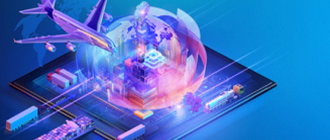
Blockchain Technology Is Delivering The Future – Now
By Kawal Preet | First published: October 29, 2021 Updated: September 18, 2022
Blockchain isn’t just the tech of the future. It’s bringing significant change to our lives and how we do business.
For some time now, the rapid rate of technological advancement has felt like we’re hurtling at speed to a completely new and automated future. The past decade alone has seen big breakthroughs in robotics, artificial intelligence, augmented and virtual realities, and blockchain. Far from being a futuristic concept, these tools and technologies are already being successfully put to use across multiple industries.
And the environment around us is constantly evolving, transforming, and challenging the status quo. From the metaverse to machine learning, powerful trends are shaping and reshaping lifestyles, driving new technologies, and changing business and human behavior. It’s crucial for industries to stay up to date with these changes and respond timely for success.
Blockchain: evolving way beyond the future of data security
Take blockchain, for example. This technology, when first explored, was viewed as the future of data transfer, particularly in finance. In reality, blockchain is already bringing significant change to our everyday lives, as consumers demand more transparency into the products they purchase.
Blockchain technology — a virtual way of recording and verifying a high volume of digital transactions started out as the foundation of cryptocurrencies such as Bitcoin. This technology is now spreading across an entire wave of industries such as banking, insurance, healthcare, gaming and the automotive sectors. Blockchain use cases are endless, which explains why in 2021, funding to blockchain startups surged 713% YoY to reach US$25.2 billion.
The arrival of the metaverse has only increased the significance of blockchain technology. Cryptocurrencies and non-fungible tokens (NFTs) continue to grow in popularity, enabling purchases and value storage in virtual reality.
Blockchain, then, has been busy reinventing itself as essential tech of the future.
Have you ever wondered if the Fair Trade logo on the chocolate bar or jar of coffee you purchased is authentic? With blockchain, every piece of information - from the exact GPS coordinates of the cacao tree, to the manufacturing facility, the logistics provider, and the retailer is digitized and recorded in an encrypted format, then saved in a single trusted source.
Whether a consumer wants to check the ethical sourcing, sustainability, or authenticity of the product they purchased, blockchain is the technology that verifies each step in the supply chain and validates the genuineness of the information. Blockchains operate through a decentralized platform requiring no central supervision, which means they are resistant to fraud.
Dynamic, experimental, sustainable: the future is now
The success of any future technology depends on it being:
- Dynamic
- Experimental
- Sustainable
Blockchain fulfils all three criteria. Simply put, ‘the future is now’. To be dynamic, industries must adapt to environmental or technological changes. They need to be a force of change that motivates, affects development, or challenges the existing state. Blockchain matches this approach by taking information already available in multiple places, and not only making it secure, but providing access for anyone along the supply chain, including the consumer.
Blockchain fulfils all three criteria. Simply put, ‘the future is now’.
The daily discovery of new uses and their potential to solve real-world challenges show the technology’s dynamic nature. From increasing the efficiency of disaster relief to improving consumer services, a wide range of uses are being explored.
Blockchain in the global logistics and supply chain market alone is set to grow to $3.3 billion by 2026. In fact, when blockchain works with other emerging technologies, it becomes even more effective and impactful in providing users insight into details about products throughout the supply chain.
Similarly, to be experimental, trial and error and imagination is crucial to be progressive. The simplicity offered by blockchain allows industries to experiment with its uses. This can result in the creation of new business models and more efficient processes within an organization.
For example, life-saving pharmaceuticals and emergency medical supplies, including the COVID-19 vaccine, often come with specific prerequisites in terms of temperature and shelf life. The integration of blockchain and IoT can increase the traceability and reliability of information regarding critical medical shipments throughout the supply chain.
Sustainability has also been a driving force behind the change of business practices, and the range of products offered. Fueled by the need to spread awareness of eco-friendly practices, many manufacturers and retailers are actively adopting steps to reduce their carbon emissions and keeping consumers informed. Here blockchain plays a critical role in creating a clear record of product history and sustainable sourcing initiatives adopted, which allow consumers to make a more informed purchase decision.
Disruptive technologies like blockchain are creating the network for what’s next
To be successful, technologies should be scalable, experimental, and sustainable. Additionally, for any new or innovative technology to have a lasting impact, these technologies need to have clear real-world applications. Blockchain is a prime example of a disruptive future technology that is unfolding in the present, enabling both consumers and industries alike. The logistics industry is ready to respond.
SHARE THIS STORY
- Generative AI: A New Frontier
- How To Ship A Giant Panda
- How To Make Freight Shipments Work For Your Small Business
- The Rise Of Intra-Asia Trade: Opportunities In The China-Southeast Asia Corridor
- Where Do Old Planes Go When They Retire?
- What’s So Dangerous About Coconuts? Your Guide To Dangerous Goods Logistics
Sign up now and save on your shipping rates!
Sign up now and earn discounts by shipping instantly with FedEx Ship ManagerTM at fedex.com.
Recommended For You

How Can Technology Deliver Superior Customer Service?
Logistics technology can help small businesses connect with their customers in new ways. Kawal Preet shares how healthcare businesses can grow.
Read More
The 5G Logistics Revolution
Possibilities of 5G are game-changing. Companies should start integrating advanced technology to future-proof their business and remain competitive.
Read More
Enhanced Transparency And Security With Blockchain Tech
Originally known for powering virtual currencies, blockchain technology now reveals a broader set of possibilities beyond the financial realm.
Read More


